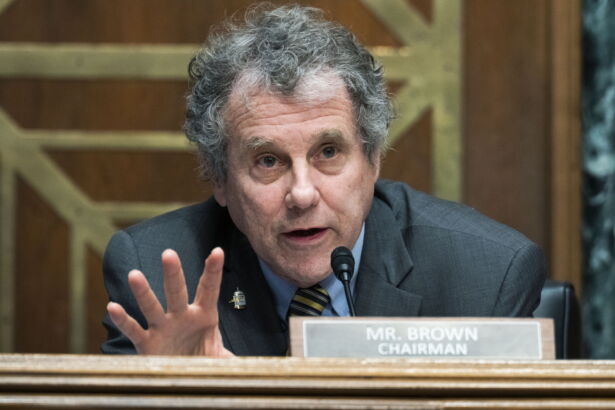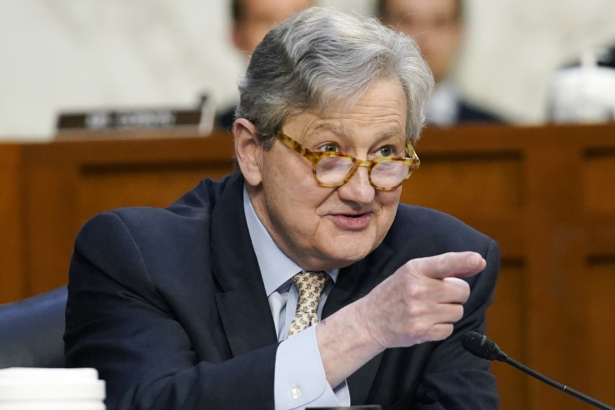During a Senate Banking Committee hearing on Tuesday, senators denounced the actions of Silicon Valley Bank (SVB) CEO Greg Becker, who has been accused of distributing bonuses and selling stock in the bank shortly before its collapse.
“In 2022, in particular, you [Becker] paid yourself a $1.5 million cash bonus even as the value of the company that you’re managing declined by two-thirds,” said Sen. J.D. Vance (R-Ohio). The senator criticized the former CEO for selling a “significant amount of SVB stock” on February 27, not even two weeks before the bank’s failure.
During the hearing on the failure of both SVB and Signature Bank, committee chairman Sen. Sherrod Brown (D-Ohio) confronted Becker, stating, “You were paying out bonuses until literally hours before regulators seized your assets. To people in Ohio and across the nation, this feels uncomfortably familiar.”
He continued: “Workers suffer the consequences while executives walk away unscathed. It seems that only in corporate boardrooms can you drive your business into the ground, take the entire economy down with you, and emerge on top. We cannot allow this pattern to repeat.”
Becker sold $3.6 million worth of SVB stock on February 27, shortly before the bank experienced a run and was taken over by regulators in early March. Over the past two years, Becker and other SVB executives collectively sold $84 million in company stock.
Senator Brown is currently working on a bill that aims to empower regulators to reclaim compensation from executives of failed banks.

In defense of the stock sales, Becker claimed that he regularly sold shares as part of his compensation plan and was unaware of SVB’s impending troubles when he arranged the sale. He also asserted that the executive bonuses had been determined prior to SVB’s collapse.
Sen. Bob Menendez (D-N.J.) raised concerns about the Federal Reserve issuing over 30 supervisory warnings to SVB before its collapse, information that was not made public at the time. Menendez suggested that Becker may have engaged in insider trading by relying on that non-public information.
When questioned about the significance of the warnings as material information, defined as non-public information that could impact the company’s stock price, Becker expressed his belief that they were not material.
Menendez responded, “Thirty different supervisory findings, all of which contributed to the bank’s collapse, and you did not consider them material findings. Perhaps you can understand why our shareholders, observing from the outside, might feel differently.”
Cost of High Interest Rates
Throughout the hearing, senators criticized SVB for its rapid growth and compensation policies that rewarded executives for taking on excessive risks without hedging against the risk of rising interest rates.
Sen. John Kennedy (R-La.) pointedly remarked, “If you had purchased those hedges, it would have impacted your profits, wouldn’t it? If you had earned less money, it would have affected your bonus, wouldn’t it? You placed all your bets in one basket.”

Senators are directing their scrutiny toward Becker due to the collapse of SVB, which sparked a crisis of confidence in banks and compelled regulators to safeguard all of SVB’s uninsured deposits to prevent further bank failures. Since March, three out of the four largest bank failures in the United States have occurred. Most recently, First Republic Bank became a casualty resulting from SVB’s collapse when regulators shut down the San Francisco-based regional lender and orchestrated its sale to JPMorgan Chase.
Regional banks, which play a vital role as lenders to local businesses, continue to struggle with diminished deposits and deflated stock prices following SVB’s failure.
Senator Brown firmly stated: “The primary responsibility for the banks’ crash lies with the bankers themselves.”
Becker told senators that no bank could have withstood the social media-fueled bank run on SVB. In a single day, SVB faced a withdrawal of $42 billion from its depositors, consisting of tech companies and venture capitalists, as news of the bank’s financial troubles spread. This event marked the fastest-ever bank run.
He also defended SVB’s decision to invest heavily in Treasury bonds, which have incurred substantial unrealized losses for all banks—including the Federal Reserve—amid the rising rate environment. Becker argued the Federal Reserve misled bankers.
“Crucially, throughout 2020 until late 2021, the Federal Reserve consistently communicated that interest rates would remain low and that the emerging inflation would be transitory,” Becker stated in his testimony.
However, senators seemed unconvinced by his argument, highlighting that supervisors had repeatedly pointed out SVB’s interest rate risk. Lawmakers asserted that SVB’s actions were driven by excessive greed and emphasized that the company had failed to fill key risk management positions.
“Anyone who closely followed the economy over the past two years could have clearly anticipated the Federal Reserve’s continued interest rate hikes,” said Sen. Tim Scott (R-S.C.), the ranking Republican on the committee. “SVB’s situation was an anomaly, and your lack of judgment, Mr. Becker, demonstrates that you should not have been at the helm of the bank.”
From The Epoch Times
